The AMD Ryzen Threadripper 3960X and 3970X Review: 24 and 32 Cores on 7nm
by Dr. Ian Cutress, Andrei Frumusanu & Gavin Bonshor on November 25, 2019 9:05 AM ESTCPU Performance: Web and Legacy Tests
While more the focus of low-end and small form factor systems, web-based benchmarks are notoriously difficult to standardize. Modern web browsers are frequently updated, with no recourse to disable those updates, and as such there is difficulty in keeping a common platform. The fast paced nature of browser development means that version numbers (and performance) can change from week to week. Despite this, web tests are often a good measure of user experience: a lot of what most office work is today revolves around web applications, particularly email and office apps, but also interfaces and development environments. Our web tests include some of the industry standard tests, as well as a few popular but older tests.
We have also included our legacy benchmarks in this section, representing a stack of older code for popular benchmarks.
All of our benchmark results can also be found in our benchmark engine, Bench.
Speedometer 2: JavaScript Frameworks
Our newest web test is Speedometer 2, which is a accrued test over a series of javascript frameworks to do three simple things: built a list, enable each item in the list, and remove the list. All the frameworks implement the same visual cues, but obviously apply them from different coding angles.
Our test goes through the list of frameworks, and produces a final score indicative of ‘rpm’, one of the benchmarks internal metrics. We report this final score.
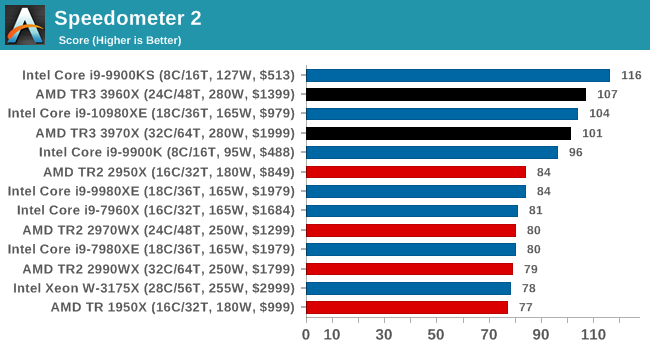
Google Octane 2.0: Core Web Compute
A popular web test for several years, but now no longer being updated, is Octane, developed by Google. Version 2.0 of the test performs the best part of two-dozen compute related tasks, such as regular expressions, cryptography, ray tracing, emulation, and Navier-Stokes physics calculations.
The test gives each sub-test a score and produces a geometric mean of the set as a final result. We run the full benchmark four times, and average the final results.
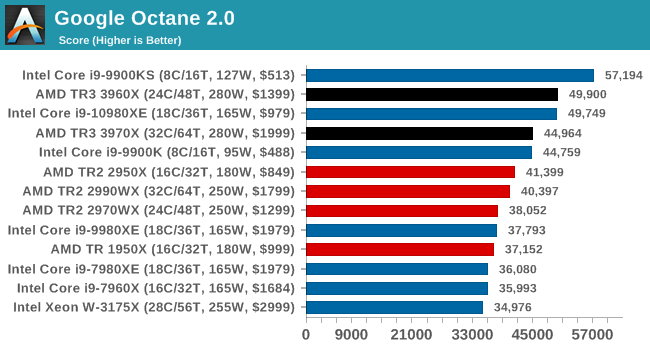
Mozilla Kraken 1.1: Core Web Compute
Even older than Octane is Kraken, this time developed by Mozilla. This is an older test that does similar computational mechanics, such as audio processing or image filtering. Kraken seems to produce a highly variable result depending on the browser version, as it is a test that is keenly optimized for.
The main benchmark runs through each of the sub-tests ten times and produces an average time to completion for each loop, given in milliseconds. We run the full benchmark four times and take an average of the time taken.
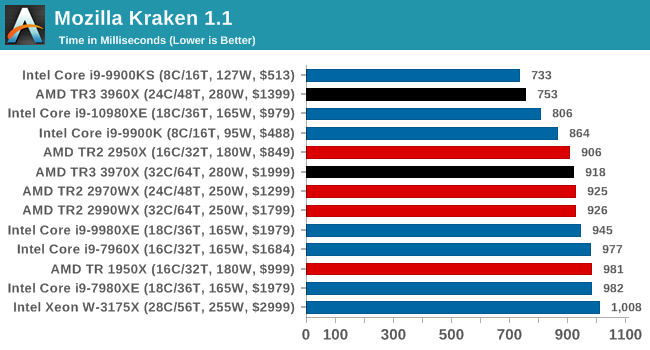
3DPM v1: Naïve Code Variant of 3DPM v2.1
The first legacy test in the suite is the first version of our 3DPM benchmark. This is the ultimate naïve version of the code, as if it was written by scientist with no knowledge of how computer hardware, compilers, or optimization works (which in fact, it was at the start). This represents a large body of scientific simulation out in the wild, where getting the answer is more important than it being fast (getting a result in 4 days is acceptable if it’s correct, rather than sending someone away for a year to learn to code and getting the result in 5 minutes).
In this version, the only real optimization was in the compiler flags (-O2, -fp:fast), compiling it in release mode, and enabling OpenMP in the main compute loops. The loops were not configured for function size, and one of the key slowdowns is false sharing in the cache. It also has long dependency chains based on the random number generation, which leads to relatively poor performance on specific compute microarchitectures.
3DPM v1 can be downloaded with our 3DPM v2 code here: 3DPMv2.1.rar (13.0 MB)
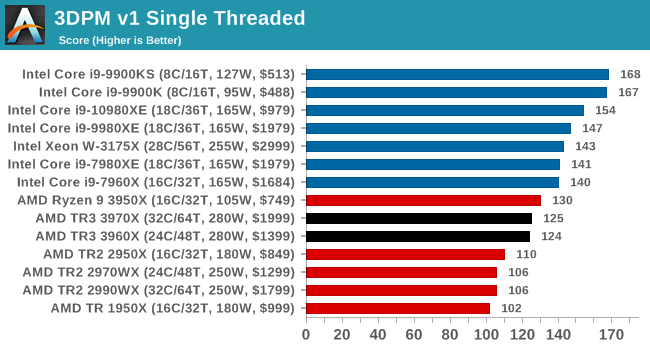
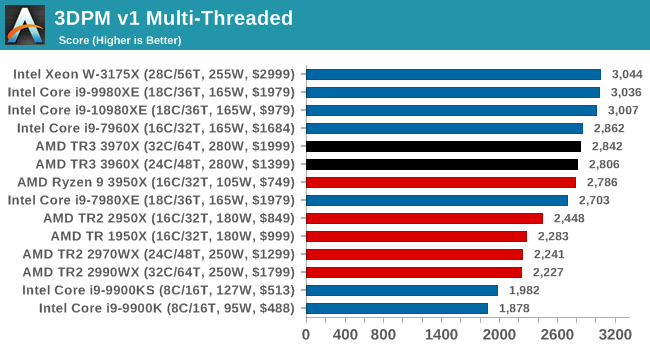
x264 HD 3.0: Older Transcode Test
This transcoding test is super old, and was used by Anand back in the day of Pentium 4 and Athlon II processors. Here a standardized 720p video is transcoded with a two-pass conversion, with the benchmark showing the frames-per-second of each pass. This benchmark is single-threaded, and between some micro-architectures we seem to actually hit an instructions-per-clock wall.
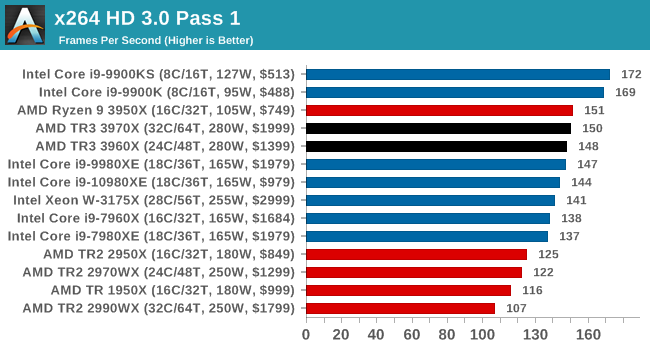
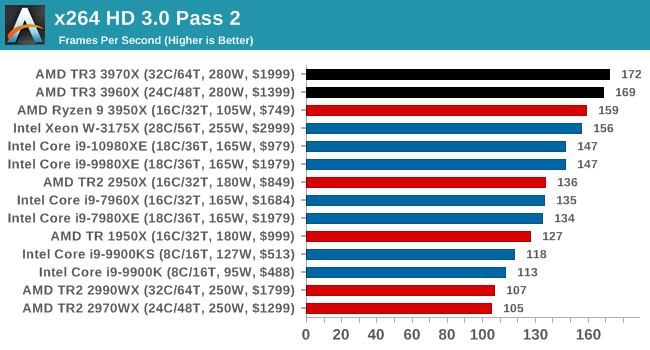
GeekBench4: Synthetics
A common tool for cross-platform testing between mobile, PC, and Mac, GeekBench 4 is an ultimate exercise in synthetic testing across a range of algorithms looking for peak throughput. Tests include encryption, compression, fast Fourier transform, memory operations, n-body physics, matrix operations, histogram manipulation, and HTML parsing.
I’m including this test due to popular demand, although the results do come across as overly synthetic, and a lot of users often put a lot of weight behind the test due to the fact that it is compiled across different platforms (although with different compilers).
We record the main subtest scores (Crypto, Integer, Floating Point, Memory) in our benchmark database, but for the review we post the overall single and multi-threaded results.
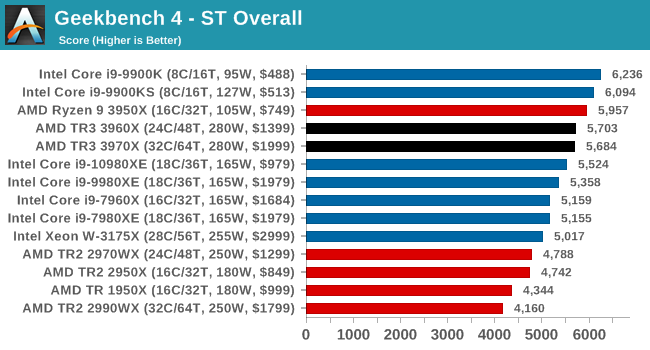
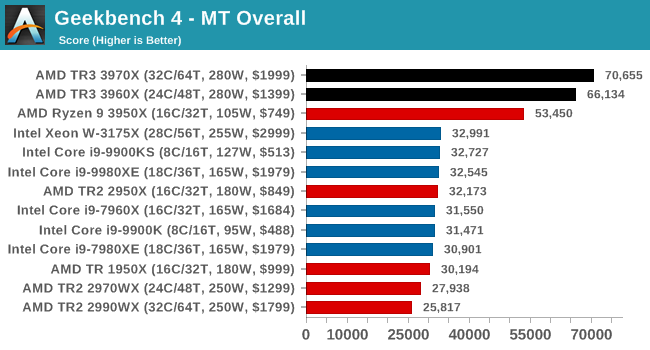










245 Comments
View All Comments
PeachNCream - Tuesday, November 26, 2019 - link
Very much agree with this statement. Desktops are a shrinking market segment. Mainstream home users and corporate office computing assets are generally now laptops regardless of whether or not the mobility makes sense or is a necessity. Yes, there is a market for desktop computers and that market does include massively parallel workloads that benefit from lots of cores/threads, but the center of mass in terms of money in CPU sales has shifted to portable computing where AMD is still lagging due mainly to power consumption and heat output. The I/O die design AMD uses is not so great in that sense and Intel still has an advantage in the mobiel sector.Xyler94 - Tuesday, November 26, 2019 - link
Both of you are actually wrong.Intel doesn't care about laptops, it's a side project basically. Both Intel and AMD want Server space. Servers are the heart of the market. Especially Supercomputers. Intel wouldn't care one bit if AMD took 25% of the laptop market, but you can see Intel scrambling and panicking at every single percent AMD gains in the Server Market.
Laptop CPUs are so little margin, Intel wouldn't actually care if people buy AMD. Servers and HEDT processors are such high margin, they'd rather 1 person buy a Xeon or 2066 processor than 10 people buying laptops. It's all about profits, not units sold.
PeachNCream - Tuesday, November 26, 2019 - link
Have you looked at Intel and/or AMD's income breakdowns out of their financial reports? I have. You're assertion is not correct.Korguz - Tuesday, November 26, 2019 - link
" Desktops are a shrinking market segment " im not so sure about that... no one i know wants a notebook, for portability, they have their phones or tablets for that...upanddown - Monday, November 25, 2019 - link
Your revenue numbers don't mean anything. 15 years ago Nokia was also unbeatable, as well as Yahoo, MySpace etc..For Intel, there is a chance that similar to "after-Athlon" era will never come again.
Xyler94 - Monday, November 25, 2019 - link
Especially since the bribes are what made Intel keep goingdrothgery - Monday, November 25, 2019 - link
No, what made Intel keep on going was AMD's lack of manufacturing capacity (they couldn't have supplied much more than 25% of the CPU market in the Athlon 64 X2 era even if they wanted to), inferior laptop CPUs, and lack of infrastructure to support their server/workstation CPUs. Since going fabless, they're nowhere near as capacity constrained now, and may have more of the server infrastructure figured out... but Zen 3 doesn't have anywhere near the advantage on 10th-gen Core that Athlon 64 X2 derivatives had on Pentium 4 derivatives, either.If Intel can get cores/$ and total core counts reasonably close to EPYC and TR (which is likely), they'll be fine in the long run.
Korguz - Monday, November 25, 2019 - link
drothgery you didnt hear about how intel would bribe and threaten OEMs and the like NOT to use amd products ? thats what hurt amd way back when, thats why intel payed a billion or so to amd to settle that.. what advantage ?? zen 2 has more IPC then intel, why do you think intel needs such high clock speeds to compete with lower clocked cpus ??Xyler94 - Tuesday, November 26, 2019 - link
You don't know the history of the mid 2000s, do you?drothgery - Tuesday, November 26, 2019 - link
Reality and AMD fanboy mythology are not the same.Did Intel do some shady things in the P4 era? Yes. But that wasn't the biggest reason why AMD failed to gain more ground than they did on Intel then.
Did AMD have the manufacturing capacity to handle a significantly bigger market share than they actually got? No.
Did Opeteron have serious infrastructure issues vs Xeon? Yes, they did.
Did AMD's laptop chips suck compared to Pentium M and its follow-ons? Also yes.